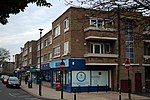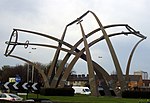Plantsbrook Local Nature Reserve
Local Nature Reserves in the West Midlands (county)West Midlands (county) geography stubs

Plantsbrook Local Nature Reserve is a nature reserve on the Plants Brook in The Royal Town of Sutton Coldfield, near Birmingham, England, consisting of open water, wetland, woodland and meadow. It is located on Eachelhurst Road, on the border of the Pype Hayes and Walmley districts. It was designated a Local Nature Reserve in 1991.The reserve, managed by Birmingham City Council, measures 10.72 hectares (26.5 acres) and is used as an educational resource.
Excerpt from the Wikipedia article Plantsbrook Local Nature Reserve (License: CC BY-SA 3.0, Authors, Images).Plantsbrook Local Nature Reserve
Ashford Drive, Birmingham
Geographical coordinates (GPS) Address External links Nearby Places Show on map
Geographical coordinates (GPS)
| Latitude | Longitude |
|---|---|
| N 52.5277 ° | E -1.7961 ° |
Address
Plantsbrook Nature Reserve
Ashford Drive
B76 1EN Birmingham
England, United Kingdom
Open on Google Maps






